The Peoples Empire, Australian Pure Democracy
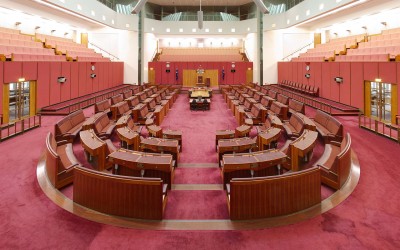
Part two of a series by Philip Ayton on ‘The Revolution of Evolution in Australian Politics‘.
We live in a world where the majority of people have handed over a large slice of “control”, to representative bureaucracies. Democratic institutions to which we give up our own power of leadership and direction, so that someone else can worry about it.
There are many western lifestyle examples of dissemination of power, that we could use. However, this article I wish to concentrate on the amount of control we have given our elected political representatives.
Our ‘freely elected democratic representatives’ appear to have misplaced much of the moral code of true democracy, which is;
“A system of government in which power is vested in the people, who rule either directly or through freely elected representatives.”
We hand them the keys to the nation, and we sit back helpless for each 3 year cycle as governing body after governing body proves itself inadequate to manage the fragile balance of the country while staying true to the people that put them in power.
The modern politician, rather than finding solutions and sticking to them, would rather pass the buck at the first opportunity, moving onto the next willing scapegoat in the endless game of political hot-potato on all the major issues.
A consideration is that, we as the public may silently enjoy engaging in this type of tabloid politics. Politics where we have the power to criticise however hold no responsibility for action or inaction. A righteous yet hollow position?
I choose to believe that we are better than that. I believe that Australians as a whole, are so utterly fed up with the system around them, that until a viable option to fix the system is presented, we can only sit back and laugh. The running joke is the Australian political system and the lack of vision or motivation to address it.
Though how long can we truly sit back and continue to chuckle about the ridiculous state of affairs that is Australian politics today?
Can we really continue to laugh at the misrepresented, the corporate entanglement in policy direction, the personal financial motivation of politicians, the lack of sustainable vision into the future, the extreme neglect of the environment and continual policy flip flopping, a seemingly total lack of accountability and the failed concept of leadership which has been long lost on the Australian political frontier?
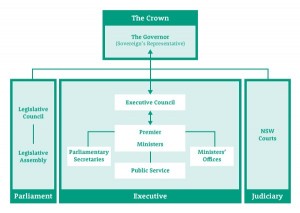 Why can’t we as the people start to take control of the situation?
Why can’t we as the people start to take control of the situation?
Is it not possible, to look forward to the future ourselves, look at the options and decide what is best for our country, together as a majority?
A proposition, where we could all, at the very least, have our voices heard?
Why must we be locked into this outdated version of the hybrid Westminster-style governing formula, when it stopped serving us long ago?
The scholars of today, have considered other options, the cries for a more democratic democracy have been heard. Though solutions to such problems don’t come easy. In fact, the solution may in fact come from our very distant past.
What if there existed a democratic system, that could allow us to vote on these issues and make the best decisions for the majority, by the majority. The people.
There is a system such as this and it’s called ‘pure democracy’. A system by which the majority vote of the people, is the will of the nation, and the governments, ONLY exercise the will of the people.
The concept is not new. You would have to go back all the way to ancient Athens to discover its true origins.
A literal and pure democracy is where the people discussed the issues of the day and guided the governments direction for the running of the nation.
Unfortunately, these original systems were replaced with what one could call, aristocracy, an oligarch based democratic that we still operate under today.
Essentially the will of the nation is dictated by a select minority (usually wealthy minorities control the interest in oligarch systems through, wealth, military, corporation or Royal Title).
To have a voice in such a system is but an illusion of true democracy.
Do we not vote according to information provided as their “plan” in power?
By what measure do the representatives get weighed to their success at meeting pre-election commitments?
Under this system when a representative fails the people, what recourse as a nation do we have to realign the government with our established and agreed expectations?
Ultimately we have very little realistic power to address the inadequacy of our ‘leaders’, unless the consensus of parliament wants change, the people only have 1 chance every 4 years to change the governing party.
What protections are in place, to prevent and restrict corruption?
None. The headlines for the last 3 decades have highlighted the lack of transparency within government.
Back yard handshake deals, flip flopping on major election policies and promises, bribery scandals, ongoing exploitation and corruption of the legal and judicial systems all make for regular news content.
When you compress the welfare of 23,000,000 Australians, into small, select, representative groups, who have to conform to “party lines”. Lines that are often determined by the financial support afforded by their investors, how can the issues of the majority truly be heard, or acted upon, beyond our single election vote at the polling booths?
When objectively reflecting on the current system, there is no reason why the inclusion of the proposed alternative of pure democracy cannot exist symbiotically. The inclusion of pure democracy will ensure that the people have a seat at the negotiating table of the major decisions and will only enhance the transparency, quality and equity of the decisions that are made.
Have you ever wondered why the majority of Australian ruling governments of today don’t consider exercising the plebiscite legislation more often in matters of national interest?
The majority of Australians, who were indeed interested in specific issues, could and would be happy to voice their views for the majority to consider and vote on in an informed and calculated way.
Ultimately the proposal is that the Australian voters should consider electing representatives from a political party with only one interest group, the Australian people. Like the other parties, their interest group funds, guides and supports their stance but unlike the other parties, this interest group represents everyone, not just cashed up factions.
Currently, there are a number of developing contenders for such a system in Australia, as of writing this article there is only 1 registered with the AEC which will see candidates running in the next election.
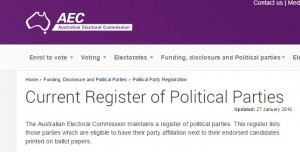 When many (if not most) Australians are saying ‘it doesn’t matter who you vote for’, could the very real possibility of significant change be worth consideration?
When many (if not most) Australians are saying ‘it doesn’t matter who you vote for’, could the very real possibility of significant change be worth consideration?
Perhaps you, yourself, could stand up and be counted as a pioneer of pure democracy, also known as ‘direct democracy’ in Australia?
Would you be willing to inform people about a system, that gives everyone a voice on the issues that matter to them?
The power of Direct Democracy, is it represents everyone individual in Australia equally. A system that truly reflects the decisions of the majority, a system that remains neutral and bipartisan and with no “overriding” hidden powers.
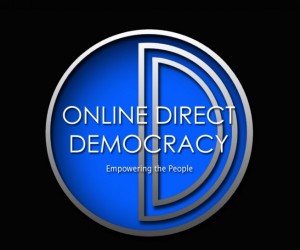 The only AEC registered direct democracy party ‘Online Direct Democracy’(ODD), is inciting change and has started the discussion about moving the country forward, for and on behalf of the people of Australia.
The only AEC registered direct democracy party ‘Online Direct Democracy’(ODD), is inciting change and has started the discussion about moving the country forward, for and on behalf of the people of Australia.
A long shot in the current political landscape, but how long before people begin to realise, that ODD is the first true alternative to the current system, that works within the current system, for the people.
An alternative, that by constitution and design are bound to representing everyone. Their Motto: We Are You – Empowering The People.
What do the people of this great country think?
Join the discussion about the future interests of Australia and its people.
Like what we do at The AIMN?
You’ll like it even more knowing that your donation will help us to keep up the good fight.
Chuck in a few bucks and see just how far it goes!
Your contribution to help with the running costs of this site will be gratefully accepted.
You can donate through PayPal or credit card via the button below, or donate via bank transfer: BSB: 062500; A/c no: 10495969









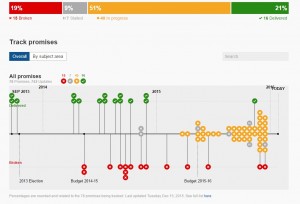

14 comments
Login here Register here-
Phil -
peter mitchell -
Rob -
Philip J Ayton -
Ian Williams -
mars08 -
Rob -
5ime0n -
Philip J Ayton - Relevant to them
- They are entitled to vote, based on location etc. No point people in perth voting on state issues in NSW…
-
votedave -
Philip J Ayton -
Pisser Offerer -
Matthew Oborne -
Philip J Ayton
Return to home pageThis is a breath of fresh air. I no longer trust or believe in our party dominated ‘representative’ system. The writer has stated many of the reasons why. And there are many more sound reasons supporting the claim that Australian politics is bereft of ideas, morality, ethics and humanity. As a grandparent I refuse to be seen as responsible for leaving them with this decrepit, corrupt system. I have joined the ODD and the major parties have well and truly kissed my trust and vote goodbye.
we as a species are evolving to embrace practical, objective common sense so we may together correct and heal our species many ailments, environmental degradation; indigenous genocide; governing and justice systems hypnotised with ego masturbation; protecting preserving promoting and perpetuating usury capitalist debt slavery management strategy upon the blood of our social body. in this age of hi tec connectivity we could all cast votes pretty easily, the whole Centrelink is online
One problem I have with a “democracy” is that, in theory at least, 51% of the people can tell the other 49% what to do.
At least this is my understanding of “majority rules”.
Is this correct?
There is still a long path ahead, but the conversation has started. A 70% majority is the ODD ruling.
It’s not that the major parties, couldn’t represent the people, they refuse too. It’s up to the people to stand and be counted. Say, enough is enough. Show them,that we can organize ourselves.
Then, what becomes the use of them? 🙂
The writer reflects a sanity that is captivating. The ideas discussed are worthy of applause and support. I’ll be joining.
@Rob: “… in theory at least, 51% of the people can tell the other 49% what to do.”
Depending on the type of system, that’s how it could work… if you had only two parties. In a system with four contestants you could be looking at something like a 30-28-24-18 split.
OK, this actually sounds the same as an idea I’ve been growing (in my head) for some time. A representative is ONLY accountable to his/her constituents and he/she must vote according to their wishes. There are NO parties, no left/right etc. No permanent (literal) seat allocations in the house, if you’re first in that day you can sit at the front, every MP gets the same sized office and same number of staff, etc etc.
Somebody has to control them, so maybe a speaker has to be elected one way or another.
Each MP polls his people and votes as mentioned above. It then requires a (for example) 70% majority of the MPs to pass legislation.
But how do we get a 70% vote? Is that 70% of the people, or 70% of those that voted? Truth is most people don’t care unless you are voting for a new footy stadium, in which case you will probably get an 90% vote but that still doesn’t make building it the right thing to do.
Another example, guns. Most people live in the city and have no interest in or need for a gun. As there are only about 5% of the population with them they would be outvoted in a jiffy. But why should the 95% have control over the 5%? People should be able to do what they like UNLESS it adversely effects others. (and let’s not go off on an anti-gun tangent here, it’s just one typical example)
In both the above scenarios the 10% non-footy fans and the 5% gun owners are (potentially) ridden roughshod over.
Even a 99% majority is not necessarily valid if it stops the 1% from pursuing their chosen path with no detrimental effect on the other 99%.
As I said I’ve been mulling this over for some time, but (so far) I cannot come up with a viable method that’s not open to undue influence by the media and various charismatic personalities, that requires people to be experts on everything, and that requires people to adopt a live-and-let-live attitude.
Most people just aren’t qualified to make such decisions, and those that are are bought and paid for.
Fascinating article and interesting debate. However, The scenarios suggested by Rob do make a point. The current system is able to provide for minority groups in a way that a Direct Democracy cannot. Instead of overhauling the entire system, wouldn’t it be simpler for the public to insist that regulation governing elected representatives be improved?
Don’t ask those in power to make this decision, let the people dictate that politicians are not overpaid as they are now; that to be a public official is to sacrifice some privacy for the sake of transparency; encourage individuals to run for office who have an background in logic, reason and the scientific method; ensure we have members of parliament who understand that they must sublimate what they want for what their electorate wants.
There are plenty of arguments for and against these measures, but all in all, it would seem for more reasonable to repair the system we have before we attempt to create a new one.
@Rob
I’m speculating but I imagine. That people would vote on the issues
There would still be local elections etc, shire, and state, then national.
In relation to the gun debate, it would not be a simple case of “yes or no” for or against guns.
There would be other small votes, relating to recreational firearms, sport, hunting, farming, pest management etc. The sum total of the outcomes (speculation) would lead us to a national vote on whether. “Everyone can own a gun” or “should everyone be licensed and have a legitimate use etc.”(which is the current case)
A number of people attacking this concept will obviously draw on the extreme “left” & “Right” issues. However, there will be a whole line of “common sense” issues, that would have to be approached before major left-right issues made it to the national level.
At this point in time, ODD would work within the current framework of existing government, whilst providing “proof of concept” to the greater public, to highlight the overwhelming power of the Direct democracy format. A nation in control of its own interests, seems like a fairy-tale. Representatives who ONLY vote on the majority call.
Everyone will be free to vote on the ODD system regardless of political preferences or party alliances.
It’s a long road ahead, but at least people have started talking about alternatives, and may begin to value their vote again, as under ODD, their Vote is their voice and it’s counted on the issues that matter to them.
Also, human nature at this point in our evolution does not allow us to please everyone. A 100% majority I feel would almost be impossible. 70% is a solid 7 out of 10 people support this, 3 out of 10, were either “undecided” or against.
Comparing it to the current “representatives system”, some issues appear to go against the majority, regardless of the noise made by the people.
Again, I’m speculating, check them out, see for yourself. Ask them questions, they’ll be more than happy to answer.
Amazing, and I thought AIMN had no consideration of evolution just an ongoing convulsion about “business as usual”. Perhaps you could cast a glance toward DemocracyOS.org who have released an app to actualise direct democracy based on their experiences and practical application – check out the Pia Mancini TED Talk. Personally, really suspect of anything that frames itself as a political party, way too open to the abuses we witness on a daily basis with the existing parties. There are other means and modes far more suitable and less susceptible to corruption.
Great Link @votedave 🙂
What other modes could you suggest, that can exist within this system, and not be susceptible to the corruption of it?
What private enterprise, could prevent it from said corruptions if a political enterprise cannot?
Replacing this current system, is a decade or more away.
However, the concept of a technological based direct democracy, is that it can work within this current framework of existing government -TODAY-, and people can have their voice at least counted as part of every relevant decision, that the party would be required to make. Regardless of the person/voters normal party. All they would have to do, is vote ODD at the next election.
This has to be a step in a better direction.
?? Do we really ‘give up our own power of leadership and direction, so that someone else can worry about it’? Leaving aside that I wasn’t aware that I was somehow instilled with some power to lead and direct the administration of laws regarding various peoples and social groupings that I know nothing about…
Whatever it is that I’ve ‘given up’ as it’s put here, or ‘delegated to a better-resourced and more informed mechanism,’ as another way of putting it could go, I was of the view that in doing so I’d made a specific, conscious choice to support a mechanism that is far better placed to make informed decisions on law than what I am. I’m a voter, I’m not a politician nor do I have any affiliation with any party – but contrary to what this article suggests I believe, if I may speak on behalf of myself I’d like to say that I DO believe in the current representative system, it’s underpinned my living in a peaceful, prosperous, progressing society where health outcomes are improving, people are sufficiently accepting of one another that war is something that I can’t envision happening here and my kids will have it as well as any previous generation of kids have had it ever, anywhere (though that’s of course dependent on various environmental and political assumptions holding). Personally I find it really frustrating how some elements like to claim they speak on behalf of ‘Australians as a whole’ and suggest, without any evidence beyond sweeping, evidence-free assertions about the corruptions of ‘the system’, or those apparently inherently evil, corrupt, non-human species known as the politician, that we need to get rid of the current system and build a completely new one. Would you be able to give us a bit of evidence as to why an old system is such a failure that we have to abandon it for a new one before you suggest that it’s irrefutable that a new system is better? Just saying that military and corporate interests, amongst others, dictate political decisions doesn’t constitute evidence at all – should we just all believe it’s the case because you said it is? And can you give us a bit of a run down on the methodology you employed for determining that Australians as a whole are of the view you’ve posited them to have?????? Direct democracy sounds all noble and what not, but as condescending as it is to say, I thought it was a pretty widely accepted assumption that ‘the masses’ don’t always make the best decisions, not because they’re inherently dumb or gullible or incompetent, but because they have their own lives to lead and can’t be expected to be so unbelievably talented subject matter experts on everything that their vote will always achieve the optimal outcome. I fear to see what would happen if you let public opinion decide what happens to asylum-seekers, carbon outputs, law-breakers, business practices etc etc etc. Just because more people say something, that doesn’t mean it’s true or good. Have a look at how many people don’t ‘believe’ in climate change, despite the evidence posed by scientists who actually know a bit about it. Regardless of what you say is best, I don’t think I want to let a mass of Daily Telegraph readers decide that climate change is probably just a hoax and we should all get digging new coal mines.
All that said, I recognise the particular article above is more about an option for changing the way voting and representation works, and while I don’t know enough about it yet to have a view on how valid an option it is, I do agree that working to improve things is a valid, valuable endeavour. I just think it’s worth doing so via drawing on evidence, and using that to improve what demonstrably needs improving, not just deciding for everyone that a completely new way of doing things is better for them after having a bit of a thought bubble or reading an influential article or two. Don’t tell me you speak on behalf of me and I should just trust that your way is better because you say it is – give specific evidence of what’s not working, and specific evidence of why your alternative can be shown to be better, and then I’ll come to the table. (Apologies if this all sounds too hostile and aggressive – I do appreciate that the article is an attempt to think about things, and change things for the better, and these are more than applaudable)
40 percent of working Australians have insecure, casual or part time work, I wouldnt call that secure or peaceful and financial stress is stress funny enough. Your rights 20 years ago are not what they are now. perhaps the fact that we dont have to excercise many of the rights we have lost many don’t miss them. I routinely excercise my rights and it shocks people, I wont let government on my land without a warrant because that is my legal right, I have been told that is nuts, but not excercising your rights is nuts, excercie them and it reminds people we have rights, why should it only the criminals who are very conscious of our rights.
As for things getting better the western world has experienced for the first time a decline in life expectancy in some countries because of politics.
We will have a generation where home ownership is not the norm. conditions have slid in some important areas.
People when given the facts usually make the right decision. propaganda and lies that make decision making hard.
fact the refugees are not an issue, fact therefore there is no need to demonise them or lock them up.
Fact unemployment is a mechanism the RBA uses indirectly to control inflation.
Therefore Fact we shouldnt demonise unemployed.
Fact we can detect the human carbon output from volcanoes.
Fact we know we are increasing the carbon in our atmosphere.
It is the liars and the cheats that make democracy harder to achieve because lying about leaded petrol made it harder to legislate against.
we were being poisoned and the monied men decided they preferred profits and who cares if we are poisoned, that gave birth to what has essentially become a small industry. obfuscation.
Without Obfuscation without lies people usually make good choices.
As we know with out those two things the Libs would never get in government.
There is the real issue, the Libs will never tell us what they plan that is horrid.
Some good points in there. I do agree that my implications were broad and sweeping, essence of a good rant on a subject of passion.
It is all about starting a conversation and getting people interested. Scientific analysis of a subject is usually hard for people to swallow, so opinion pieces like this actually get people like yourself engaged, because it goes against your natural fiber to sit by and let it be, and for others who agree with the sentiment it’s a conversation starter.
.
The conversation has now well and truly started.
ODD is not the only group putting forward similar concepts. ODD party has been around the longest(senator online), have an actual understanding of the rigors and complexities of the Australian Parliamentary system, is AEC registered and will be contesting the next election.
Thanks for joining the conversation.